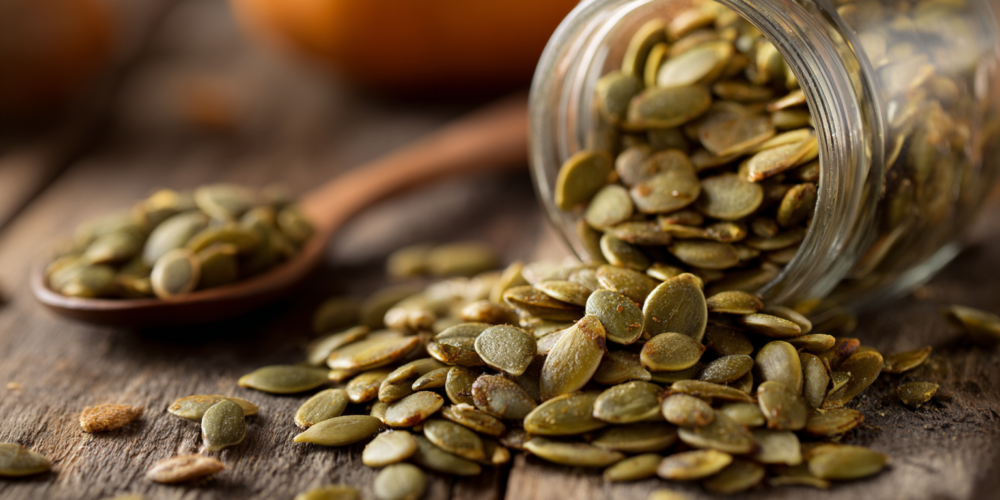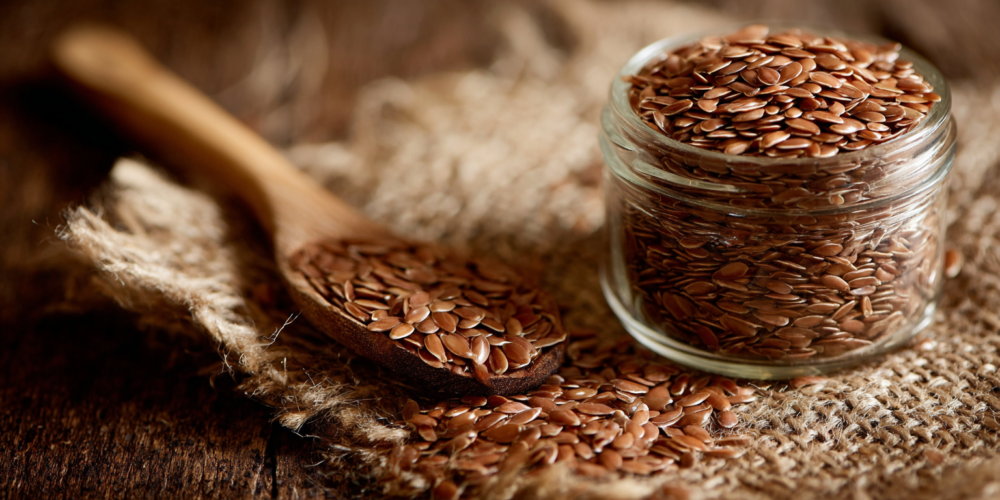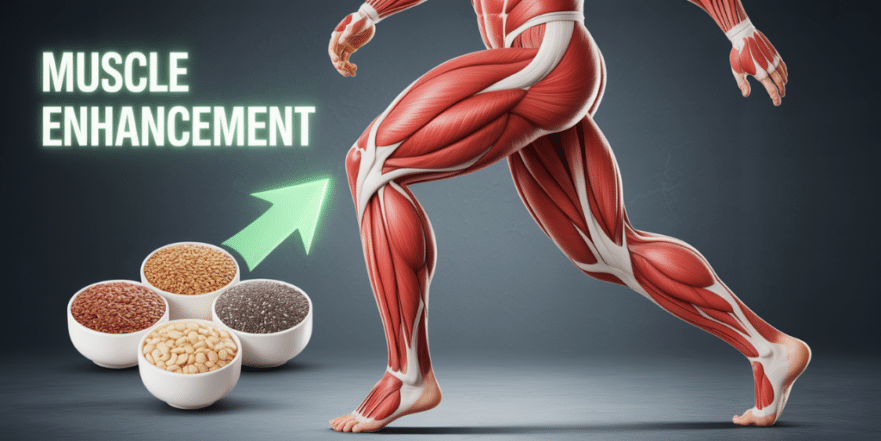
Are you looking for a simple, affordable way to boost your bone and muscle strength? Forget expensive supplements; the answer might be in your pantry! Today, we’re diving into the incredible world of seeds, uncovering nine powerhouses that can significantly improve your strength and mobility. But be warned, not all seeds are created equal, and some popular ones can actually be harmful.
We’ll explore the best seeds for your body, reveal the ultimate champion for bone and muscle health, and show you exactly how to prepare them to get the most out of their amazing nutrients. Imagine a 61-year-old man struggling with nightly calf cramps, waking up in pain. His magnesium levels were low. A simple handful of pumpkin seeds daily could ease those cramps and improve his sleep. How? Let’s find out.
➡️9. Pumpkin Seeds: The Magnesium Powerhouse

Pumpkin seeds, or pepitas, are packed with magnesium, a mineral crucial for muscle relaxation. Without enough magnesium, your muscles can stay tense, leading to those painful cramps. Just half a cup provides nearly half your daily magnesium needs. But magnesium does more than just relax muscles; it’s vital for bone health too. It works hand-in-hand with calcium, helping your body absorb and utilize it properly. So, while others spend a fortune on calcium pills, a small handful of pumpkin seeds offers both calcium and magnesium in the perfect ratio, along with zinc, which is essential for repairing muscle micro-tears.
These seeds also provide healthy fats that act as natural lubricants for your joints, reducing inflammation and stiffness. For maximum benefit, eat them raw or lightly toasted at home. Avoid excessive heat, which can damage their beneficial oils, and definitely steer clear of the salted versions from the store.
Key Takeaways
- Pumpkin seeds are rich in magnesium, aiding muscle relaxation and preventing cramps.
- They provide calcium and magnesium in an ideal ratio for bone health.
- Zinc in pumpkin seeds helps repair muscle tissue.
- Healthy fats in pumpkin seeds lubricate joints and reduce inflammation.
- Consume raw or lightly toasted, avoiding salted varieties.
➡️8. Sunflower Seeds: Your Daily Dose of Vitamin E

While many associate sunflower seeds with casual snacking, their true power lies in their exceptional vitamin E content. These seeds offer more vitamin E than even the popular almonds. Vitamin E acts as a shield for your muscle cells, protecting them from daily damage caused by free radicals produced during physical activity. Half a cup of sunflower seeds can double your daily vitamin E requirement, helping to neutralize these damaging sparks before they cause problems.
Beyond vitamin E, sunflower seeds are a good source of phosphorus, which works with calcium to strengthen your bones. They also contain selenium, a mineral that helps regenerate muscle tissue and fights inflammation in your joints. To get the most out of them, eat them raw or lightly toasted without salt. Toasting them at home on low heat until golden is best. For an extra boost, pair them with vitamin C-rich foods like strawberries or red bell peppers, as vitamin C enhances iron absorption from the seeds.
Key Takeaways
- Sunflower seeds are exceptionally high in vitamin E, protecting muscle cells from damage.
- They provide phosphorus, essential for bone strength alongside calcium.
- Selenium in sunflower seeds aids muscle tissue regeneration and reduces joint inflammation.
- Consume raw or home-toasted without salt.
- Pairing with vitamin C sources can improve mineral absorption.
⚠️Beware of Dangerous Seeds!

Before we continue, it’s crucial to be aware of seeds that are promoted as healthy but can actually be harmful. Seeds from apples, pears, apricots, and cherries contain amygdalin, which converts to cyanide when chewed or crushed. Even a few crushed apple seeds can cause dizziness and nausea. Similarly, avocado pits contain persin, a substance that can be toxic to humans, with no reliable studies proving their safety. While papaya seeds are used in some traditional medicine, high doses can harm your kidneys and temporarily reduce fertility in men. Remember, not everything natural is safe to consume. Stick to scientifically validated seeds with a history of safe use.
➡️7. Sesame Seeds: The Calcium Champion

Sesame seeds, also known as ajonjolí, are tiny but mighty, offering more calcium per gram than milk. Ancient Egyptians used them 5,000 years ago to strengthen workers building the pyramids. Each tablespoon of sesame seeds provides 88 mg of calcium, along with magnesium and phosphorus in perfect proportions for absorption. Unlike dairy, sesame seeds can be consumed without causing inflammation for many people.
Sesame seeds also contain lignans, compounds that protect your joint cartilage from daily wear and tear. However, to benefit from their nutrients, sesame seeds must be consumed ground. Eating them whole means they pass through your digestive system undigested. Grinding them or using tahini (sesame paste) makes their calcium and other minerals readily available. For optimal calcium absorption, pair sesame seeds with vitamin D-rich foods or sunlight exposure. Black sesame seeds have even more calcium and a richer flavor.
Key Takeaways
- Sesame seeds are an excellent source of calcium, magnesium, and phosphorus.
- Lignans in sesame seeds protect joint cartilage.
- Sesame seeds must be ground or consumed as tahini for nutrient absorption.
- Pair with vitamin D sources to maximize calcium uptake.
- Black sesame seeds offer higher calcium content.
➡️6. Flaxseeds: Fighting Inflammation and Boosting Bone Density

Flaxseeds are a fantastic ally against inflammation, which can cause stiffness and fatigue. Their healthy fats, particularly alpha-linolenic acid (ALA), convert into omega-3 fatty acids (EPA and DHA) in the body, helping to reduce inflammation and improve flexibility and muscle endurance. The fiber in flaxseeds forms a gel in your gut, aiding digestion and trapping toxins that can contribute to inflammation.
Flaxseeds also contain lignans, which can help maintain bone density, especially in women after menopause, acting as a natural estrogen support. Crucially, flaxseeds must be consumed ground to be digestible. You can grind them yourself or buy them pre-ground, but store ground flaxseeds in the refrigerator to prevent their omega-3s from oxidizing. Two tablespoons daily is a good starting point, but gradually increase to allow your digestive system to adapt to the fiber.
Key Takeaways
- Flaxseeds’ omega-3 fatty acids combat inflammation, improving flexibility and muscle recovery.
- Their fiber content aids digestion and removes toxins.
- Lignans in flaxseeds support bone density, particularly post-menopause.
- Flaxseeds must be consumed ground for nutrient absorption.
- Store ground flaxseeds in the refrigerator.
💪5. The Power of Sprouting: Tripling Mineral Absorption

Sprouting seeds dramatically increases their nutrient bioavailability. This ancient practice activates dormant enzymes within the seed, which break down phytic acid – a compound that locks away minerals. By sprouting, you essentially ‘unlock’ minerals like magnesium, zinc, and iron, tripling their absorption. Sprouting also makes proteins more digestible and boosts vitamin content. It’s a simple process: soak seeds overnight, drain, rinse twice daily, and in a few days, you’ll see small sprouts. These activated seeds are nutrient powerhouses, easier to digest and with a milder flavor.
Key Takeaways
- Sprouting seeds destroys phytic acid, significantly increasing mineral absorption.
- The process makes proteins more digestible and increases vitamin content.
- Sprouting is a simple process requiring only seeds, water, and time.
- Sprouted seeds have a milder flavor and are easier to digest.

